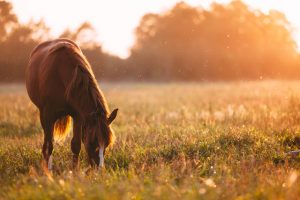Can Horses Sniff Out Poisonous Plants?
From Equine Science Update:
Recent research from Poland suggests that horses may use their sense of smell to avoid
poisonous plants.
Many plants are toxic to horses, potentially causing serious health issues or even death if ingested. So how do horses identify poisonous plants?
In the wild, horses may avoid unfamiliar plants or those with bitter or unpleasant tastes. Domesticated horses may not always avoid toxic plants. Overgrazed pastures or contaminated hay can expose them to harmful species, clouding their natural foraging instincts.
A study by Izabela Wilk and colleagues at the University of Life Sciences in Lublin, Poland, tested whether stabled horses could distinguish poisonous plants by scent alone. The researchers presented six plants to the horses, enclosed in boxes so the horses could only smell them, not see or touch them.
The plants included three poisonous species: Common Yew (Taxus baccata), Common Box (Buxus sempervirens), and Northern White-Cedar (Thuja occidentalis), as well as three non-poisonous ones: Parsley (Petroselinum crispum), Dill (Anethum graveolens), and Arugula (Eruca sativa).
The horses were trained to approach and investigate the boxes. Researchers observed the time they spent exploring each box and found that horses spent significantly more time investigating non-poisonous plants. This suggests that horses may be able to discriminate between novel odours and rely on olfaction to avoid toxic plants.
While this ability may help horses avoid danger, it is not foolproof, and their environment plays a significant role in their exposure to harmful species.
For more details, see:
Izabela Wilk, Elżbieta Wnuk, Anna Stachurska, Wiktoria Janicka, Ewelina Tkaczyk, Natalia Kumanowicz, Jarosław Łuszczyński,
Explorative behaviour in horses when presented with unfamiliar poisonous and non-poisonous plants,
Applied Animal Behaviour Science, (2024) Vol 277, 106352,











